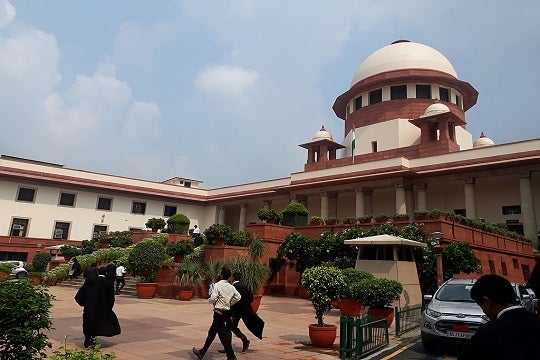Summary
In 2004, 24 per cent of the members in parliament in India had a criminal record. This increased to 30 per cent in 2009 and 34 per cent in 2014 before shooting up to 43 per cent in 2019. Expressing concern over the rise in candidates with criminal records contesting elections, the Supreme Court has directed political parties to provide reasons on their choice of such candidates. Political parties will be required to justify the choice based on the qualifications, achievements and merits of tainted candidates and not rely on the ‘winnability’ factor alone.
In a judgment delivered on 13 February 2020, the Supreme Court has mandated that political parties will have to upload details of criminal cases registered against their candidates in elections. It has ordered that the criminal history of candidates must be publicised through newspapers and social media. The parties must also list valid reasons for choosing such tainted candidates on their party plank. In the 2019 Lok Sabha election, the ruling Bharatiya Janata Party accounted for 116 of the 215 members of parliament with criminal records while the Congress had 29. More than half of these had declared that the cases pertained to murder, attempt to murder, kidnapping and crimes against women. It is reported that the parties choose such candidates due to their ‘winnability’ factor. The Supreme Court has ordered that the reasons for selecting such candidates should not be ‘winnability’ alone. Their qualifications, achievements and merits should be examined to justify their selection.
In 2018, a five-judge constitution bench ordered that all candidates should declare criminal antecedents to the Election Commission (EC). However, such declaration was often lost in the myriad details that the candidates provided Pursuant to the present order, the EC is likely to provide a revised format of the affidavit to be filed by the candidate, in which the persons will be required to separately list heinous crimes such as murder, dacoity, rape, rioting, etc. This is proposed to be done with the intent to make it easier for voters to make an informed choice after seeing the criminal antecedent of the candidate.
This judgment is bound to have a sobering effect on the political parties as they are required to submit a report on the compliance of its directions with the EC within 72 hours of the candidate being declared as selected, failing which the EC is required to bring it to the notice of the Supreme Court as it would entail a contempt of the latter’s order. It provides an opportunity to the political parties of ensuring elections become devoid of ‘money and muscle power’ if they are really committed to cleansing politics. While all parties have hailed the order, the true test will not be in the letter of the order, but the spirit in its implementation. Any choice of a candidate with a criminal record by a party, when put out in public domain, is bound to bring disrepute to the party leading to a decline in the candidate’s ‘winnability’. On the other hand, it provides the parties an escape from fielding criminals who have weakened the moral fibre of the parliament leading to degeneration in its legislative content and quality.
Now that the Supreme Court has announced its verdict, there is a huge responsibility devolving upon political parties, the EC and, ultimately, on the Supreme Court itself. No doubt the verdict has been welcomed by citizens. However, considering the display of wanton eagerness of the police in booking criminal cases against opposition leaders for unlawful assembly, obstructing public servants in the discharge of their duty or rioting, the efficacy of such a disqualification could invite protests of bias. Thus, for democracy to emerge winner, the onus does lie on the political parties to adopt a swachh rajniti (clean politics) approach. This would clearly give the party an edge in its image before the voter. Meanwhile, the EC has to show greater alacrity and prove itself to be the ‘political watchdog’. Its impartial and objective handling of even borderline cases would put the pressure on parties to ‘come clean’. Finally, the Supreme Court has cast a responsibility on itself. Once mandated by it, a lackadaisical implementation of the order will undermine the majesty and credibility of the Supreme Court. In the opinion of some political analysts, the Supreme Court has taken an extreme view and stepped on to the domain of the EC. While the cause is indeed justifiable, the parties ignoring the direction and yet escaping penal action would lead to a travesty of justice as the Supreme Court is the court of final appeal. The enforceability becomes complex due to the requirement that the choice of candidates would have to be justified to the satisfaction of the Supreme Court itself.
Considering the huge pendency in courts, would any Bench have the time to verify such claims considering that there is some election activity on in states or the parliament? The move is, however, very welcome. To make it a success, there needs to be well-defined parameters to ensure compliance. The EC should be mandated to ensure the fulfilment of the Supreme Court’s direction. Only in extreme cases need the issue go to the Supreme Court. It is sincerely hoped that the order will lead to a major ‘cleansing’ in politics in India.
Mr Vinod Rai is a Distinguished Visiting Research Fellow at the Institute of South Asian Studies (ISAS), an autonomous research institute at the National University of Singapore (NUS). He can be contacted at isasvr@nus.edu.sg. The author bears full responsibility for the facts cited and opinions expressed in this paper.
-
 More From :
More From :
-
 Tags :
Tags :
-
 Download PDF
Download PDF



